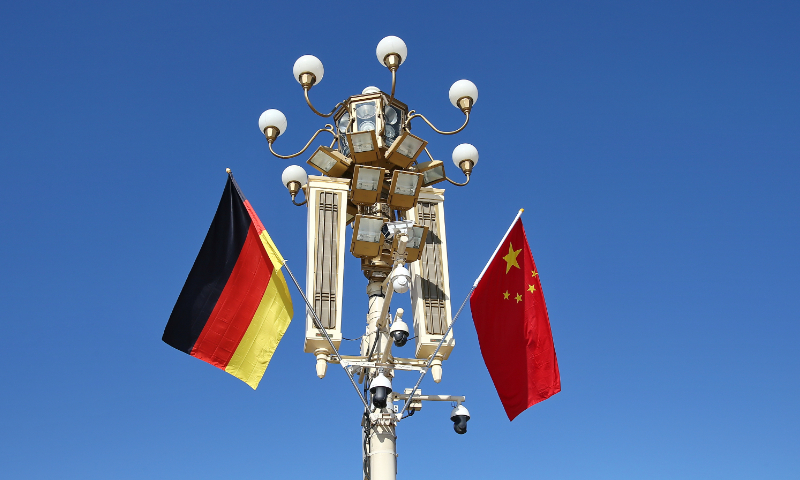
China Germany Photo: VCG
German companies have high expectations for the Chinese market, a major growth engine, and executives generally dismiss the "decoupling" narrative. Instead, they hail free trade and global efforts in building a healthy and positive business environment.
Antje Schabacker, who works at Corporate Media Relations for chemicals giant BASF, told the Global Times: "Our investment in China, the world's largest chemical market, is in line with BASF's strategy. We serve customers in the growing Chinese market through our production base in the country."
For BASF, given the importance of the Chinese market and the expected growth of chemicals production, "we remain underinvested in this area," Schabacker said. BASF's sales in the Chinese market account for 15 percent of its global sales.
China's current share of global chemicals market is about 45 percent. The market is projected to account for at least 50 percent of global chemicals output by 2030.
BASF opened a new plant in Zhanjiang, South China's Guangdong Province in September last year. The plant has an annual capacity of 60,000 tons of engineering plastics, bringing BASF's total capacity in the Asia-Pacific region to 420,000 tons from 2023.
Ola Kallenius, CEO of Mercedes-Benz Group, told the Global Times at the Paris Motor Show in October that a global trading system with fair competition and clear rules can create a win-win situation.
"Trade protectionism will kill economic growth and have a negative impact on every participating economy, which is something we don't want to see," said Kallenius.
The German automaker will ramp up investment in China, which is the company's most important market, he said.
"The group believes that the Chinese market has a broad technological landscape, making a lot of innovations in the automotive industry. This is why Mercedes-Benz continues to expand local R&D investment in China and will continue to expand our cooperative relationship," he added.
Mercedes-Benz opened a research and development (R&D) center in Shanghai in 2022 that focuses on mobility technology. The center, its second R&D facility in China, will work in fields such as connectivity, autonomous driving and big data.
Timo Breiner, spokesperson for pharmaceutical company Merck, told the Global Times that "the major challenges of our time require joint efforts of all industrial players. As a global player, we firmly believe in free trade, and bilateral and multilateral cooperation."
Merck entered into an agreement with the administrative management committee of the Wuxi National High-tech Industrial Development Zone last year to expand its single-use manufacturing center in Wuxi, East China's Jiangsu Province.
"China is a strategically important market for Merck both in terms of market size and growth potential. We want to diversify our footprint according to our customer base," Breiner said.
Although there is a slowdown in bilateral trade due to the complicated global economic environment, cooperation potential between the two countries remains significant, experts noted.
From January to October, China's exports to Germany reached $98 billion, up 6.5 percent year-on-year, according to Chinese customs data. China imported $93 billion worth of commodities from Germany, down 5.6 percent.




